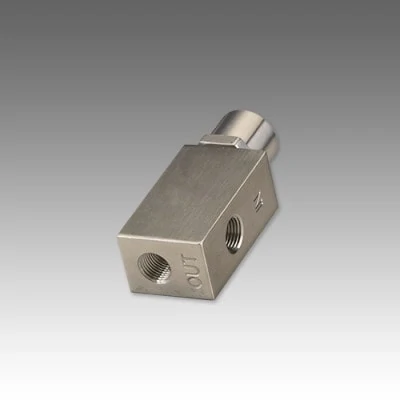Hydrogen is a versatile gas used in applications across food processing, electronics manufacturing, chemical production, energy, and fuel, just to name a few. No matter the use, safe and durable hydrogen control valves are crucial to any hydrogen application.
Purpose of Hydrogen Control Flow Valves
The purpose of hydrogen control flow valves (also known as Excess Flow Valves or EFVs) is to regulate the emission of hydrogen manually or automatically. Valves guard against scenarios like a sudden disconnection or breakage of a pipe or hose. If an accident leads to uncontrolled fluid release, the valve responds by sealing off the flow.
An Excess Flow Valve is essential when handling specialty gasses like hydrogen — it is a crucial component of any hydrogen application. Preventing the uncontrolled flow of gasses and liquids is vital in meeting necessary safety regulations, plus it protects your equipment and other company resources.
What to Look for in Hydrogen Control Flow Valves
Here are the most important factors to consider when selecting valves for hydrogen applications.
Follow Best Practices
There are no precise guidelines for industrial valves. That said, our team at ChemTec follows best practices and standards like the Pressure Equipment Directive, ASME, ISO/TC, ISO/TR, and SAE when manufacturing excess flow valves for hydrogen applications.
Choose Steel or Metallic Materials
Hydrogen applications often occur under extreme conditions, placing high demands on valve performance. For example, some processes require gas storage at high pressure and/or extremely low temperatures.
We recommend valves using austenitic stainless steel 316 or 316L to handle the strain. Other metallic materials may be suitable for hydrogen services, but it’s best to seek expert advice for your specific application. Our team at ChemTec is always here to help you choose the best option or create a custom design.
Keep Parts Compatibility in Mind
Remember that valves are made up of different parts, and each must be compatible with the specific hydrogen application. Specifically, ensure that all materials, such as the seals, are suitable for your environment.
Proper valve installation and settings are crucial to a valve functioning properly. It is important to follow the recommended installation and maintenance directions specific to the valve. Work with a specialist before choosing parts for these applications.
ChemTec’s Excess Flow Valves
Constructed of high-quality materials such as 316 stainless steel and brass, ChemTec’s line of Excess Flow Valves (EFVs) are designed with features that optimize the control and flow of liquids and gases. ChemTec manufactures EFV configurations that are ready-made for common industry applications, including hydrogen. Our team can also create custom EFVs to fit specific needs.
Many hydrogen applications can benefit from ChemTec’s High-Pressure EFV Series, which handles a maximum pressure of 6,000 PSIG, features a controlled bleed that resets automatically, and a PSO option.
For example, when hydrogen is stored at 2,400 pounds per square inch (PSI), as it is at cell phone towers, it can quickly escape through even the most microscopic opening. ChemTec’s HPEFV (high-pressure excess flow valve) protects against potentially dangerous leaks by shutting off any excessive gas flow almost instantly.
Submit an Application Inquiry
Our Research and Development team works directly with clients to design and build custom parts that can meet your unique needs. Get in touch with one of our developers today.
